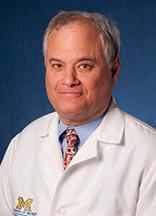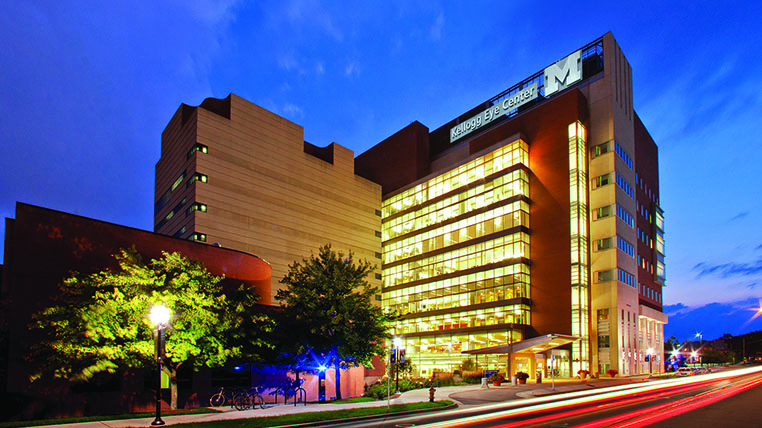Program Description
The Eye Plastic, Orbital and Facial Cosmetic Surgery Service at the University of Michigan Kellogg Eye Center offers one two-year fellowship position every two years. The fellowship fulfills the requirements of, and has been approved by, the American Society of Ophthalmic Plastic and Reconstructive Surgery (ASOPRS).
This fellowship provides particularly robust training in eyelid, lacrimal and orbital surgery, post-Mohs reconstructions, socket reconstruction, and pediatric oculoplastic surgery, and prepares fellows for a career encompassing all aspects of oculoplastic surgery.
Fellows will gain comprehensive training in the clinical evaluation, surgical management, and pre- and postoperative care of patients with oculoplastic disorders. The size and scope of Michigan Medicine, the University of Michigan’s academic medical center, and the Kellogg Eye Center’s status as a state, regional and national referral center, creates the opportunity to see highly diverse and even rare cases on a routine basis. Regular surgical experience at the Veterans Affairs Ann Arbor Healthcare System Hospital complements and rounds out the training experience.
Broad Training Experience
Michigan Medicine includes inpatient hospitals for adults and children and specialty centers in cardiovascular care, cancer treatment, eye care and women’s health. Our faculty members operate regularly at the University of Michigan C.S. Mott Children’s Hospital, providing an exceptional training experience in pediatric oculoplastic surgery. Michigan Medicine is home to one of the busiest Mohs surgery programs in the world. This provides fellows with advanced training in post-Mohs reconstructive surgery, as well as a strong understanding of the pathobiology and clinical science of cutaneous tumors, including rare Merkel and sebaceous cell carcinomas.
Ophthalmic Pathology
The ophthalmic pathology laboratory provides the backdrop for exploring the pathophysiology of orbital, eyelid and lacrimal disorders. Kellogg physicians are leading clinical trials in the field of ophthalmic and orbital oncology, and the ocular oncology program provides expertise that stretches beyond intraocular tumors to ocular surface and periocular tumors.
Thyroid Eye Disease
The Kellogg Eye Center has one of the busiest and most accomplished centers for treating thyroid eye disease, with more than 200 orbital decompressions performed yearly using the latest surgical techniques. The TED Program, which brings together oculoplastic and strabismus surgeons as well as orthoptists, holds monthly multi-disciplinary conferences that also include representation from neuro-radiology, endocrinology, nuclear medicine and endocrine surgery.
Collaboration Among Residents, Fellows, Scholars
Fellows will join a cohort of trainees in ophthalmic subspecialties including cornea, neuro-ophthalmology and pediatric ophthalmology service. Faculty on the Eye Plastic, Orbital and Facial Cosmetic Surgery Service collaborate with colleagues in otolaryngology, plastic surgery, craniofacial surgery, oral and maxillofacial surgery, neurosurgery, rheumatology, dermatology, endocrinology and infectious disease, and fellows will have ample exposure to these fields, including operating time. Interaction with visiting international scholars of the Center for International Ophthalmology also provides a rich learning experience for fellows.
The Opportunities of a World-Class Research University
The University of Michigan is a world-class research university, with the highest level of research funding of any public university (see - http://www.research.umich.edu/ ; http://www.research.umich.edu/research-u-m). The Department of Ophthalmology and Visual Sciences has a particularly close collaborative relationship with the School of Engineering, with several faculty holding joint appointments in Engineering and Ophthalmology, resulting in research collaborations that have led to patent applications, clinical trials and clinical applications.
Fellows are required to pursue at least one major thesis project with their preceptors during their fellowship. However, opportunities are limitless for pursuing every type of research imaginable through collaborations that can form the foundations of an academic career in oculoplastics.
Clinical Training Site
University of Michigan Kellogg Eye Center
Department of Ophthalmology and Visual Sciences
1000 Wall Street
Ann Arbor, MI 48105
For a look inside the Kellogg Eye Center, visit the Why Train at the Kellogg Eye Center page.
How to apply
To apply for the University of Michigan's ASOPRS-approved Eye Plastic, Orbital and Facial Cosmetic Surgery Fellowship, please submit your application through the San Francisco Match Program. We are not able to accept applications directly. Additional required information may be mailed to you.
Ophthalmology Fellowship Match
P.O. Box 7584
San Francisco, CA 94120-7584
Phone: 415-447-0350
Program Director
- Christine C. Nelson, MD, FACS
University of Michigan Kellogg Eye Center
1000 Wall Street
Ann Arbor, MI 48105
Phone: 734-764-4163
Fax: 734-936-2340
E-mail: [email protected]
Eye Plastic, Orbital and Facial Cosmetic Surgery Service Faculty
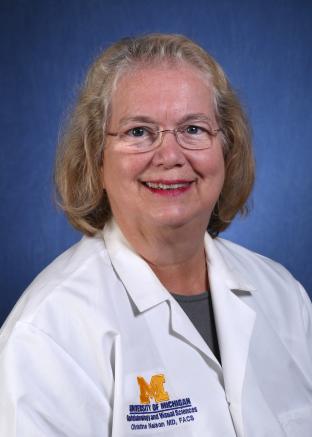
Christine C. Nelson, MD, FACS
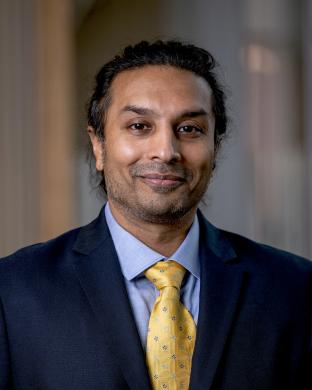
Vinay Aakalu, MD, MPH
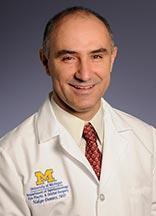
Hakan Demirci, MD
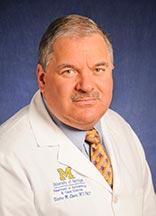
Victor M. Elner, MD, PhD
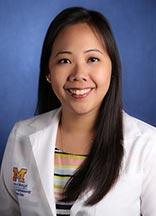
Denise S. Kim, MD
